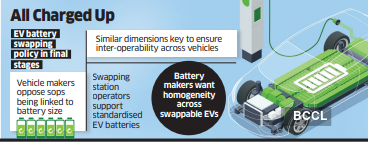
India is unlikely to link the likely subsidy for battery swapping to adherence of standards, to be announced soon.
Existing electric vehicle manufacturers are opposed to homogenous swapping standard.
Battery Swapping Policy has already been finalised and will be notified shortly, said an official, privy to the development.

“The standards mentioned in the policy play an imperative role in the effective rollout of the policy and in building a comprehensive ecosystem for battery swapping,” a senior official told ET.
Industry had raised concerns around the interoperability during a recently consultative meeting held by the Ministry of Consumer Affairs, Food, and Public Distribution.
It is expected that the development of interoperable Indian standards will ensure a level playing field to all the manufacturers as any manufacturer can design their product as per the requirements mentioned in the Indian Standards. “A key focus is to prevent monopoly over the battery swapping ecosystem,” another official said.
The interoperable standards will offer the customer convenience of easy access to battery swap stations at the nearby market, parking lots, or fuel stations preventing monopoly of any particular service provider.
Under the proposed policy, it has been stated that demand side incentives offered under existing or new schemes for electric vehicle (EV) purchase can be made available to those with swappable batteries. The centre presently offers a subsidy to domestic electric vehicle manufacturers through the Rs 10,000 crore Phase-II of the Faster Adoption and Manufacturing of Hybrid & Electric Vehicles (FAME) in India scheme.
“Battery Providers shall receive the subsidy, provided the battery swapping ecosystem that they represent satisfies the technical and operational requirements,” the draft policy document had said. Despite the government’s stand, officials say that the vehicle manufacturers do not want to lose their control over the battery swapping ecosystem since it is a most critical component of EVs. Multiple representations from EV makers reviewed by ET said that standards should not be defining the dimension of batteries but safety measures should be there.
The suggestion from an established two-wheeler maker in the country stated that while safety cannot be compromised but it is too early for fixed battery size.
Pitch from a lobby group representing vehicle manufacturers emphasized that standardisation of proposed interoperability on batteries sizes, and form factors; connectors and communication protocol will create a roadblock for innovation and also create an artificial monopoly in the industry.